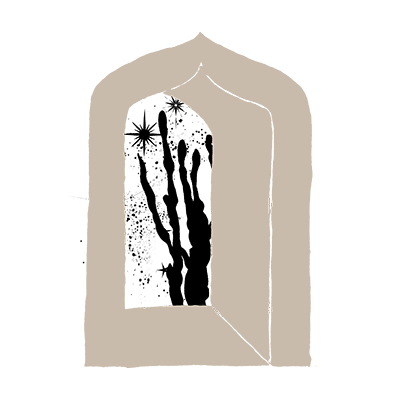I’m the youngest of five daughters, 12 years younger than next oldest to me. Growing up, it was just my mom and me; my older sisters were mostly off being wild, out of the house or doing their own thing. What dots my memory the most about my childhood is how much time I spent alone.
Also, that we were poor. I knew it bone-deep. Mine wasn’t a family where things were swept under the rug, and though it was probably a heavy thing for a kid to bear, my mother talked to me a lot about money. Or, um, the lack of it. You’ll know what I mean if you also experienced this as a kid: I grew up with not-enough weaving itself in the fabric of my being.
Nothing was purchased without there being a sense that it was dangerous to do so; even trips to the grocery store inspired a shrinking feeling. I felt constantly in a dance between EAT ALL THE GOOD FOOD NOW WHILE IT’S THERE (meaning: Doritos), and EAT AS LITTLE AS POSSIBLE SO IT’LL LAST.
It wasn’t conscious, of course. I don’t think I realized Not-Enough was a part of my every move until one afternoon, post-college, in the kitchen of my host family in Dublin, Ireland. I was making coffee and reaching for a few of these insanely addictive little biscuit cookies that were always kept in the cupboard. (I chalk my sudden awareness up to the fact that I’d recently developed a meditation practice, so I felt hyper-aware of everryyytthiiinnng.)
Placing my little cookies on a little plate next to my coffee, I felt an anxiety creep up into my body. It’s a feeling I call my Hungry Child: Soon these’ll be gone. Better have more.
Have you ever known or worked with children who’ve been neglected? One of the most common symptoms of neglect is hoarding and hiding; children who’ve endured this kind of abuse will often hide food under their beds or in secret places only they know about, or they’ll wake up in the middle of the night, to be found eating on the kitchen floor at 2am.
My feeling standing at the kitchen counter that afternoon I was twenty-three was similar. It meant I was not only a solid 30 pounds heavier than my frame really warranted, but I was also wracked with an anxiety, I realized, all the time. Fear that when I wanted something, there wouldn’t be enough.
The fear of not-enough will keep you wound up so tightly that you will either hoard your resources or else spend them wildly for the sheer thrill of having — and the anxiety of having to take care of anything of value.
There is rarely peace. Money is spent before it’s earned. Clutter accumulates. Relationships are often polluted with fear — or even abuse — because the function that tells our brains we are safe and worthy is riddled with anxiety chemicals and adrenaline.
You don’t have to have been neglected or abused as a child; you don’t have to come from a family where money was in short supply. All that’s required for the fear of not-enough to be toxifying your capacity to feel safe is that fear was present, and something was withheld.
Was it love that was withheld? Patience? Actual physical resources like food or clothing? Was your freedom in jeopardy? Was there a fear that if you did or didn’t do something, you’d be punished? Or rewarded?
As children, our brains are nowhere near developed enough to discern the behavior of our major support system from our basic okay-ness. We cannot compartmentalize. Everything we experience is the truth, and it lodges itself in our cells, laying the foundations for what will become our patterns for connecting and creating for the rest of our lives.
WHERE IN YOUR LIFE ARE YOU LIVING IN FEAR OF NOT-ENOUGH?
Is the connection you share with your partner always falling short of what you expect or hope for?
Does your creative work (or the idea of it) stem from a fear of annihilation — or destitution?
Does money feel like it slips through your hands, or avoides you completely?
Answering these questions honestly is a mighty task. It’ll be painful going back into the catacombs of your memory to dig up what about your current state of not-enoughness feels familiar — which is another important question to ask yourself:
Does [current sucky not-enough situation] feel familiar?
Chances are yes, it does. We create our lives out of patterns — until we become conscious of them, and train ourselves to think and expect differently. Easy? No. But a lot easier than a constant fear of not-enough.
What to do will also seem, ironically, not enough
to tackle such a big fear: Compassion.
Become so gentle with yourself that you can see your fears for what they are: impressed patterns of expectation that you inherited. That stuff’s not yours. What is yours is what you create out of awareness and deep, DEEP self-love from here on out.

